Marriage attitudes slowly change
Updated: 2013-08-13 23:31
By XU JUNQIAN (China Daily)
|
||||||||
Personality most important in future spouse, followed by looks and income
While the nation celebrates the Qixi Festival, the Chinese Valentine's Day that falls on the seventh day of the seventh lunar month, matchmaking agencies and relationship experts see less rosy prospects for marriage in the country.
A month-long survey conducted by Touchmedia, a major taxi in-vehicle advertising screen owner, found more than 70 percent of the passengers polled would be willing to help pay off a mortgage with their spouse after getting married.
 |
|
After taking the plunge with a mass wedding at a Shenzhen theme park on Tuesday, the newlyweds celebrate on a roller coaster. According to a matchmaking website, there are about 180 million single people in China of marrying age.CHEN WEN / FOR CHINA DAILY |
About 60 percent expect to get married, and ideally have a child, before the age of 29.
The survey kicked off one month before the festival to gauge people's attitudes toward love as the number of "leftover women", and men as well, keeps increasing.
The term "leftover women" was coined to refer to professional women who have not married by their late 20s.
The poll received 1.59 million responses from taxi passengers in five major cities including Shanghai, Beijing and Guangzhou.
It was one of the most answered surveys by the Shanghai-based advertising company, which had 50,000 screens across the country by the end of 2012.
When asked about "naked marriage", a recently coined term for getting married without owning a house, car or much other property, 45 percent of those polled said they are not against the idea, but less than 30 percent would "practice a naked marriage" themselves.
"The percentage came as quite a surprise to us," said Han Tingyu, the marketing director of Touchmedia. "It turned out young people today are not less traditional than the elder generations, as we had thought."
Only 10 percent of the respondents said they don't plan to get married or have a child, and less than one-fifth did not consider an apartment a necessity in a marriage.
"The only difference might be women today are more independent so that they can take up more financial responsibilities in the marriage," Han said.
However, 26-year-old Shanghai office worker Shi Lu thinks media and the public are "demonizing big cities' single marriage-aged women".
"Why make such a fuss about women sharing a mortgage in the marriage?" she asked. Shi and her fiance have just bought a 2-million-yuan apartment in Shanghai as their "future new home".
She said her commitment to pay half the mortgage drew a number of reproaches from her family and friends.
Shanghai's well-known relationship counselor and psychologist Wu Di, on the other hand, believes the rise of urban women's financial independence in China will result in a decrease in marriages.
"The criteria for choosing the other half has barely changed, with men eyeing looks and women wealth. Yet as women are becoming increasingly more powerful financially, it will be more difficult for them to find someone more powerful than them," she said.
The survey supported Wu's theory, as it showed that, after personalities, looks and income are the next top priority for men and women, respectively, when seeking a marriage partner.
According to Baihe.com, one of the country's largest online matchmaking websites, which claims to have 60 million registered members, there are about 180 million single people in China of marrying age.
Wu estimates that more than one-fifth of the post-1980s generation, even when 40 years old, will be single or divorced and living alone while having "friends with benefits".
She found "nothing wrong with it", as long as "single ladies, if not single men as well", can ignore traditional pressure and social judgment.

 PetroChina poised to dominate Iraqi oil
PetroChina poised to dominate Iraqi oil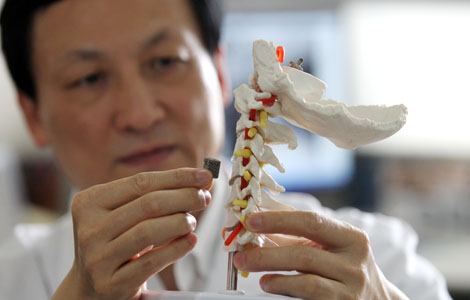
 Printed bones
Printed bones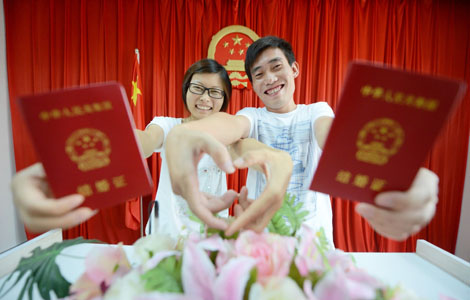
 Marriage attitudes slowly change
Marriage attitudes slowly change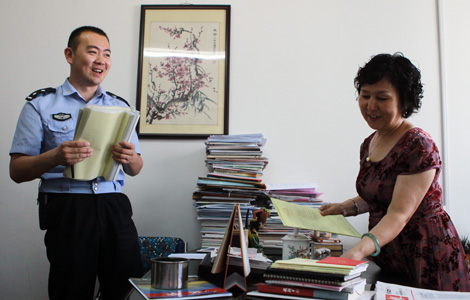
 On frontline of fight against crime
On frontline of fight against crime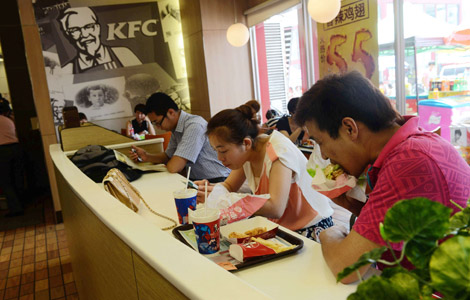
 Bird flu, slowdown hit sales at fast-food chains
Bird flu, slowdown hit sales at fast-food chains
 Apartment owner told to dismantle roof-top oasis
Apartment owner told to dismantle roof-top oasis
 Highlights from 2013 China-Russia drill
Highlights from 2013 China-Russia drill
 Billionaire unveils 'Hyperloop' transport system
Billionaire unveils 'Hyperloop' transport system
Most Viewed
Editor's Picks

|

|
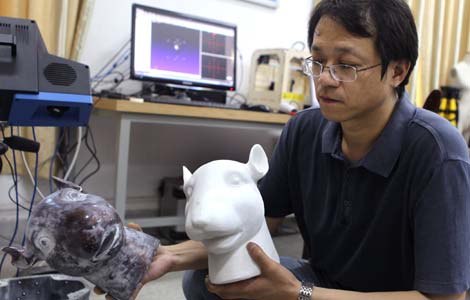
|

|

|

|
Today's Top News
Friends of accused Boston bomber due in court
Economic hub on Bohai Bay
PM to visit China for milk scare
Chinese appointed as UN assistant secretary-general
Hot times mean hotter prices
Donors of organs easing transplant shortages
China feels worst heat in half-century
Printed bones
US Weekly

|

|




